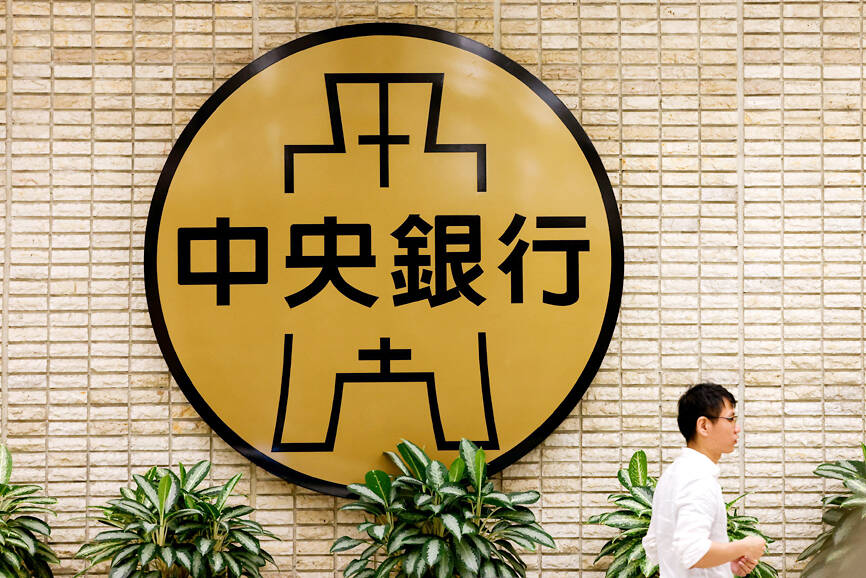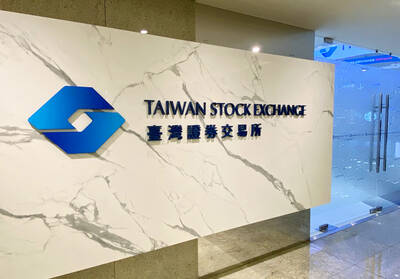Although inflation has moderated and the economy remains stable, the central bank views uncertainty from potential US tariffs as a downside risk to economic growth in the second half of the year, which warrants continued vigilance and a hold on interest rates, board meeting minutes released yesterday showed.
Board members said that the appreciation of the New Taiwan dollar against the US dollar has helped curb import prices, potentially easing inflationary pressures.
However, they cautioned that the lower inflation in May was partly due to a high base from the previous year, underscoring the need to closely monitor price trends.

Photo: Ann Wang, Reuters
Concern was raised over persistent year-on-year increases in housing rent and prices of frequently purchased goods, the minutes showed.
Some directors also warned that further NT dollar appreciation might weigh on Taiwan’s economic momentum.
One board member was less pessimistic, saying that Taiwan’s deeper integration into global value chains has reduced the export sector’s sensitivity to exchange rate fluctuations.
A weaker currency used to boost exports, but that effect has diminished due to structural changes in trade, the director said.
Another board member warned that higher US tariffs could pose risks to inflation and broader economic activity.
While some of the impact might prove transitory, sustained supply chain disruptions could result in more lasting effects, they said.
Washington has set a 15 percent tariff on Japan and South Korea, Taiwan’s major trade competitors. Against this backdrop, board members said that the economic outlook for the second half of the year remains uncertain.
On the credit front, several directors said there was a cooling in the housing market, following the central bank’s selective controls introduced in September last year.
As the ratio of real-estate lending to total bank lending has declined, but remains relatively high, most board members supported maintaining controls while continuing to track real-estate loan concentration and assessing the effectiveness of policy tools, the minutes showed.
Some banks have been more cautious in meeting their disciplinary lending targets, reflecting varied levels of prudence in credit allocation, the minutes said.

Taiwan Semiconductor Manufacturing Co (TSMC, 台積電) secured a record 70.2 percent share of the global foundry business in the second quarter, up from 67.6 percent the previous quarter, and continued widening its lead over second-placed Samsung Electronics Co, TrendForce Corp (集邦科技) said on Monday. TSMC posted US$30.24 billion in sales in the April-to-June period, up 18.5 percent from the previous quarter, driven by major smartphone customers entering their ramp-up cycle and robust demand for artificial intelligence chips, laptops and PCs, which boosted wafer shipments and average selling prices, TrendForce said in a report. Samsung’s sales also grew in the second quarter, up

LIMITED IMPACT: Investor confidence was likely sustained by its relatively small exposure to the Chinese market, as only less advanced chips are made in Nanjing Taiwan Semiconductor Manufacturing Co (TSMC, 台積電) saw its stock price close steady yesterday in a sign that the loss of the validated end user (VEU) status for its Nanjing, China, fab should have a mild impact on the world’s biggest contract chipmaker financially and technologically. Media reports about the waiver loss sent TSMC down 1.29 percent during the early trading session yesterday, but the stock soon regained strength and ended at NT$1,160, unchanged from Tuesday. Investors’ confidence in TSMC was likely built on its relatively small exposure to the Chinese market, as Chinese customers contributed about 9 percent to TSMC’s revenue last

Taiwan and Japan will kick off a series of cross border listings of exchange-traded funds (ETFs) this month, a milestone for the internationalization of the local ETF market, the Taiwan Stock Exchange (TWSE) said Wednesday. In a statement, the TWSE said the cross border ETF listings between Taiwan and Japan are expected to boost the local capital market’s visibility internationally and serve as a key for Taiwan becoming an asset management hub in the region. An ETF, a pooled investment security that is traded like an individual stock, can be tracked from the price of a single stock to a large and

Despite global geopolitical uncertainties and macroeconomic volatility, DBS Bank Taiwan (星展台灣) yesterday reported that its first-half revenue rose 10 percent year-on-year to a record NT$16.5 billion (US$537.8 million), while net profit surged 65 percent to an unprecedented NT$4.4 billion. The nation’s largest foreign bank made the announcement on the second anniversary of its integration with Citibank Taiwan Ltd’s (花旗台灣) consumer banking business. “Taiwan is a key market for DBS. Over the years, we have consistently demonstrated our commitment to deepening our presence in Taiwan, not only via continued investment to support franchise growth, but also through a series of bolt-on acquisitions,” DBS